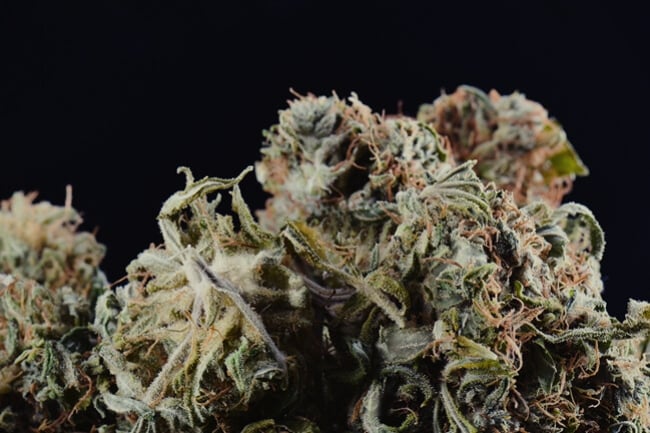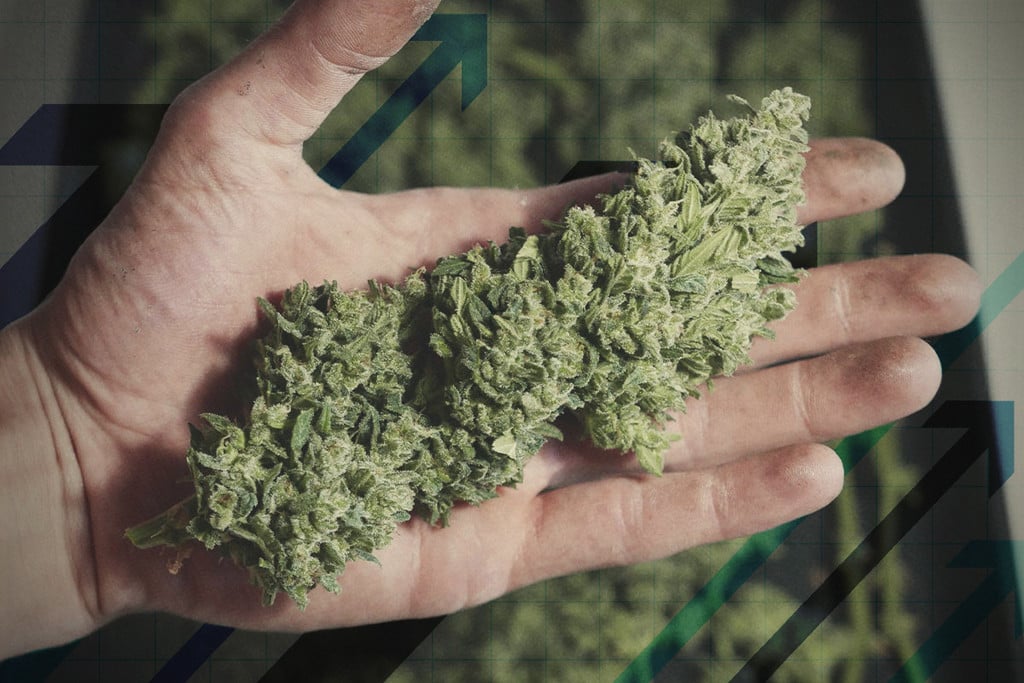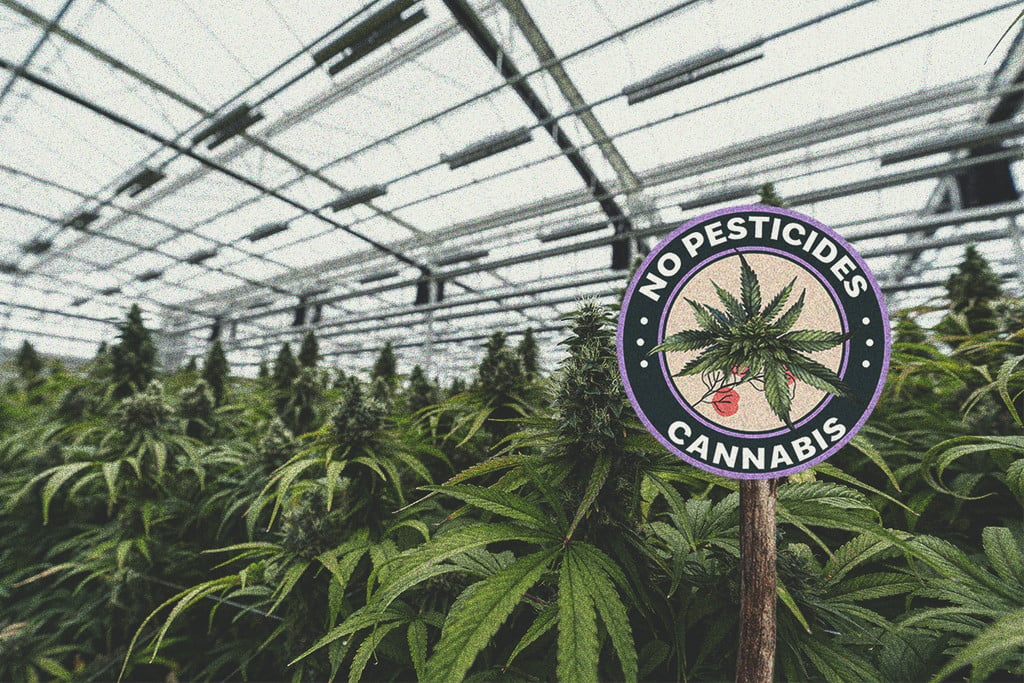.
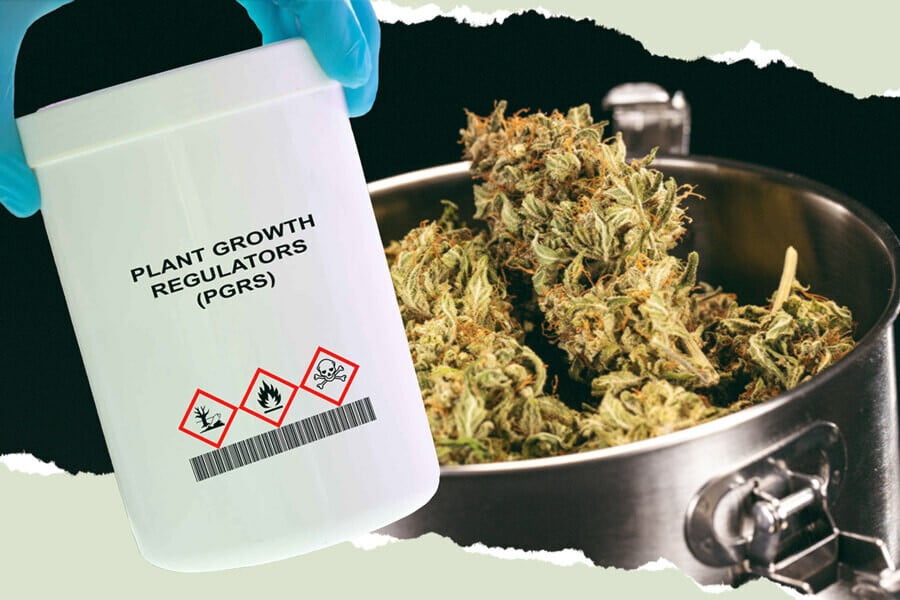
What Are PGRs and How Do They Affect Your Weed?
Cannabis consumers are becoming increasingly aware of the impact of chemical residues on their buds. Here we explore PGRs (plant growth regulators) and their effect on humans, the Earth, and cannabis buds themselves. Should you treat your weed with PGRs?
Contents:
- PGRs are naturally occurring and synthetically produced compounds that affect plant growth.
- They can increase marijuana yield but reduce terpene and cannabinoid production.
- Synthetic PGRs can be very damaging to the environment.
- Their application in food crops is associated with various health problems.
Plant growth regulators (PGRs) are chemical inputs used to improve bud size and yield. They essentially work by hacking plant hormones to accelerate processes that fuel growth, and suppress ones that deter or diminish it. However, these molecules are also known to damage the environment and might pose a threat to human health. Learn more about these controversial growth regulators, and how to identify PGR weed.
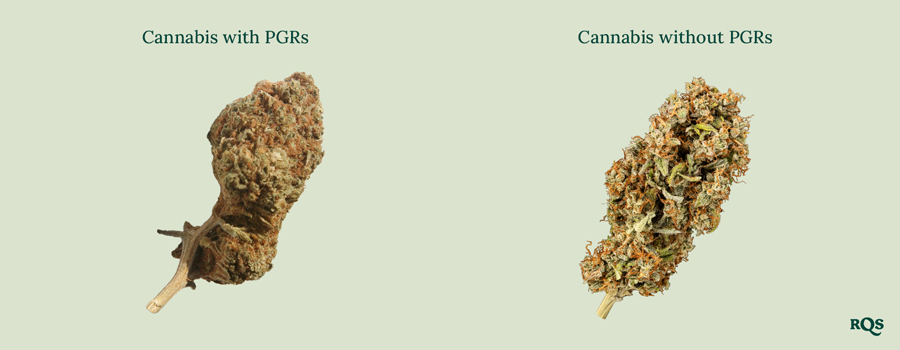
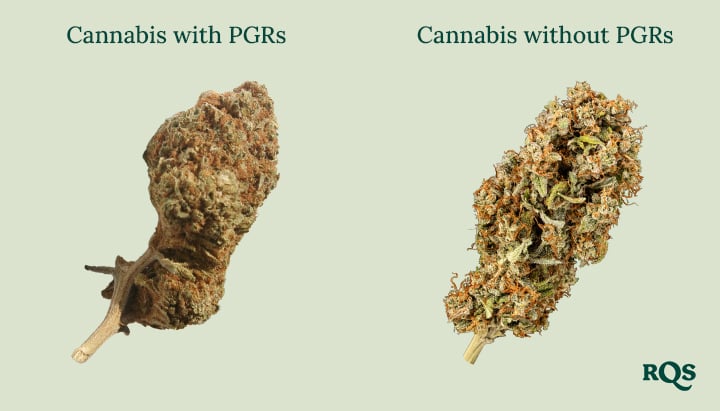
What Are PGRs in Weed?
PGRs are simple molecules that—you guessed it—aim to regulate plant growth and development. Several of these chemicals occur naturally in plants, where they help to drive important physiological processes. However, humans have successfully engineered synthetic PGRs that are applied to increase harvests and extend the postharvest life and storage quality of fruits.
Naturally, commercial cannabis cultivators have developed an interest in these chemicals. They work well on other fruit-bearing crops, so it stands to reason that PGRs could help to bolster bud size, increase harvest weight, and ultimately improve profit margins. But are they good for consumers?
Although PGRs help to maximize volume, consumers are showing increased demand for organic, sustainable, and artisan marijuana products free from synthetic inputs and grown on a smaller scale. The presence of any contaminants doesn’t sit well with many cannabis users.
But aren’t PGRs applied to food crops? They are indeed. For example, farmers apply various kinds of these chemicals to improve the shapes of apples and to stop fruits from dropping too early. But many commercially grown foods also contain pesticide residues—just because an agriculture input enhances growth and productivity doesn’t mean it's safe to ingest.
Below, you’ll get to know PGRs on a deeper level. After finding out how they work in plants, you’ll discover if they pose any danger, as well as how to identify weed grown with PGRs.
The Role of PGRs in Plants
PGRs are essential for plant growth, and thus are also essential for the growth of cannabis plants. They are plant hormones, and just like animal hormones help to regulate physiological events, plant hormones drive growth, flowering, fruiting, and other essential processes.
However, in animals, hormones enter systemic circulation to exert effects via distant organs and glands. In plants, hormones tend to produce effects right where they’re synthesized. Thus, these chemicals work to exert isolated effects—but they also work together to produce a range of responses.
| Abscisic acid | This PGR works to close stomata (the small pores on the surface of leaves) during drought conditions. Because these holes regulate the movement of gases in and out of leaves, closing them allows plants to hold on to water when the resource becomes scarce. Abscisic acid also plays a role in abscission—the natural detachment of dead leaves and fruits from branches. |
| Ethylene | This plant hormone contributes to the senescence of leaves and flowers. Have you ever picked a tomato and watched it turn red on the windowsill? You can thank ethylene for facilitating the ripening process off the branch. |
| Gibberellin | This chemical plays a key role in germination. As germination begins, enzymes free up gibberellin into its active form. The chemical then breaks the seed’s dormancy. The molecule also regulates sexual expression and plays a role in hermaphroditism in numerous species. |
| Auxin | This PGR plays several crucial roles, including the formation of root cells. Auxin also underpins phototropism—the process that causes plants to grow toward light. |
| Cytokinin | These chemicals help to drive cell division and fight off senescence. |
| Abscisic acid |
| This PGR works to close stomata (the small pores on the surface of leaves) during drought conditions. Because these holes regulate the movement of gases in and out of leaves, closing them allows plants to hold on to water when the resource becomes scarce. Abscisic acid also plays a role in abscission—the natural detachment of dead leaves and fruits from branches. |
| Ethylene |
| This plant hormone contributes to the senescence of leaves and flowers. Have you ever picked a tomato and watched it turn red on the windowsill? You can thank ethylene for facilitating the ripening process off the branch. |
| Gibberellin |
| This chemical plays a key role in germination. As germination begins, enzymes free up gibberellin into its active form. The chemical then breaks the seed’s dormancy. The molecule also regulates sexual expression and plays a role in hermaphroditism in numerous species. |
| Auxin |
| This PGR plays several crucial roles, including the formation of root cells. Auxin also underpins phototropism—the process that causes plants to grow toward light. |
| Cytokinin |
| These chemicals help to drive cell division and fight off senescence. |
Why Do Growers Use PGRs on Marijuana?
Ultimately, cultivators apply PGRs to cannabis to produce bigger and thicker buds. For commercial growers, this has obvious benefits, but for consumers, there are significant drawbacks. Although PGR weed may be visually and economically appealing, these aesthetics come at a cost.
Applying PGRs to plants essentially hacks their endogenous hormones. Naturally occurring hormones work partly by breaking down or activating DNA transcription proteins. These proteins either activate or suppress genes that promote growth, and hormones maintain control over them.
The introduction of synthetic exogenous hormones allows growers to disrupt this biological process. By adding hormones that activate transcription proteins, growers can intentionally ramp up the number of proteins that promote growth, and suppress those that slam on the brakes.
This tinkering leads to larger and thicker buds that look much more appealing to the naked eye. The activation of growth-promoting genes causes cells to uptake more water, which forces them to expand. Auxin also plays a role in increasing the size of plant cell walls.
However, despite bigger buds, playing around with plant hormones comes with a serious downside for cannabis growers; compared to normal flowers, PGR weed features lower levels of cannabinoids and terpenes. As such, these buds are much less tasty than those that don’t undergo treatment, and produce less pronounced psychoactive effects.
The reasons for this are complex. First, the amplified growth causes the redistribution of resources away from the production of terpene and cannabinoids and towards the growth of new cell walls.
Further, as PGRs suppress the production of certain stress-related hormones, the plants develop smaller trichomes, as these are essentially defense mechanisms that develop under stress.
Finally, some synthetic PGRs, especially non-organic ones like paclobutrazol or daminozide, can inhibit key enzymes in the biosynthetic pathways of terpenes and cannabinoids. This can lead to a direct reduction in the plant's ability to produce these compounds.
For these reasons, and ethical considerations around harm to the wider environment and end user, growers should be very careful before applying synthetic PGRs to their crop, and consumers should shy away from PGR-treated cannabis.
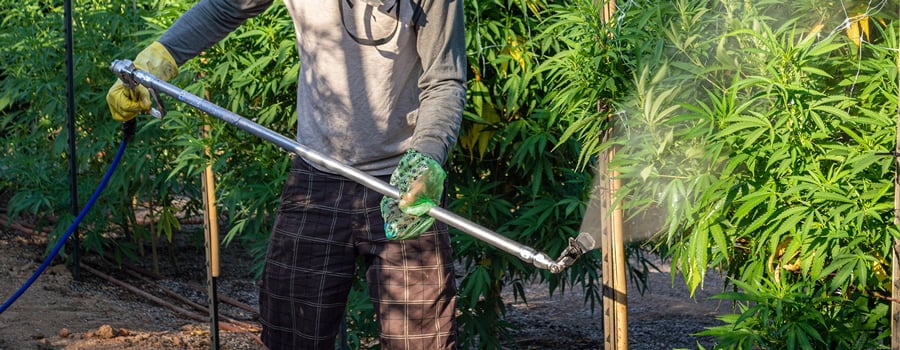
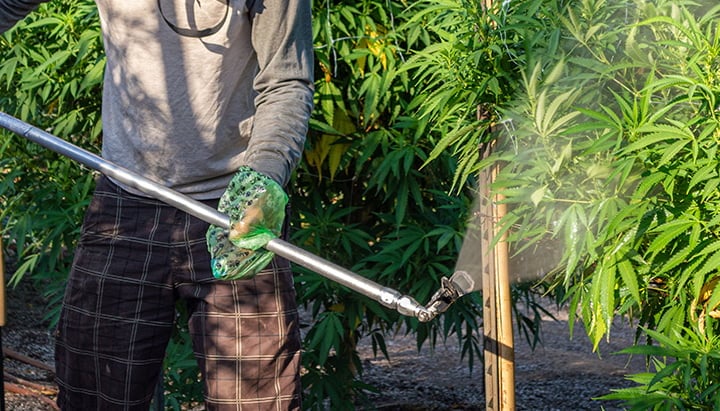
Are PGRs Dangerous?
Ongoing studies are exploring the potential impact of PGRs on human health. While PGRs are approved for agricultural use in some countries, they are banned in others. For example, European farmers are able to use daminozide as a pesticide, but it’s deemed a probable carcinogen in the United States and remains illegal to apply to crops.
Check out some of the most common synthetic PGRs below, and their potential dangers:
- Chlormequat chloride: This small and simple molecule helps to bolster yield in grains, tomatoes, and peppers, among other plants. However, exposure to the chemical can irritate the lungs and cause nausea in the short term, and can damage the liver[1] over long periods of exposure. Additionally, studies suggest that chlormequat chloride may affect hormone levels in mammals, raising concerns about its long-term safety.
- Daminozide: Approved for use in a host of European countries, this PGR is used to enhance the growth of tree fruits such as peaches, cherries, prunes, and pears. Despite its efficacy, the Pesticide Properties DataBase, published by the University of Hertfordshire, lists daminozide as a probable human carcinogen[2]. When burned, as might happen with marijuana consumption, daminozide can form nitrosamines—highly toxic and carcinogenic compounds.
- Paclobutrazol: This chemical works as a plant growth suppressor by inhibiting the natural PGR gibberellin. It helps to reduce internodal spacing and create stouter plants that fruit earlier. However, the molecule has been shown to produce reproductive and developmental issues[3] in animal models. Furthermore, studies indicate that paclobutrazol can remain in soil for extended periods, potentially affecting subsequent crops and nearby vegetation.
-
How PGRs Impact the Environment
PGRs are also known to be damaging to the wider environment, making their use dangerous not only for those who directly consume them, but for everything and everyone.
PGRs have damaging effects on a range of different systems:
- Aquatic ecosystems: Runoff from agricultural fields containing PGRs can make its way into rivers, streams, and other water bodies. Research has shown that PGRs can affect aquatic species. For example, they can disrupt the endocrine systems of fish, impacting organ development and reproductive capacity. Some chemicals, such as paclobutrazol, have been shown to bioaccumulate, meaning they persist in the food chain and pose long-term ecological risks.
- Soil degradation: Repeated application of synthetic PGRs can lead to the buildup of chemical residues in soil. Over time, this can alter microbial communities that are essential for healthy soil function, potentially reducing fertility and the ability of the soil to sequester carbon. In some cases, these residues may inhibit the growth of non-target plant species, reducing biodiversity in agricultural and natural ecosystems.
- Broader environmental risks: Poor soil practices, such as excessive tilling and lack of erosion control, exacerbate the problem by increasing runoff and allowing these chemicals to enter groundwater systems. This contamination can lead to a range of downstream effects, including the disruption of aquatic ecosystems and the pollution of drinking water sources.
-
Regional Regulatory Differences
The regulation of PGRs varies widely across the globe, reflecting differences in scientific assessment, public health priorities, and agricultural needs.
- United States: Regulatory agencies like the Environmental Protection Agency (EPA) have banned certain PGRs, such as daminozide, due to their carcinogenic potential. This has led to stricter standards for crops like cannabis, which are often consumed directly.
- European Union: While some PGRs remain in use, regulatory bodies like the European Food Safety Authority (EFSA) continuously evaluate their safety and environmental impact. Daminozide, for instance, is permitted but under strict conditions.
- Asia: In countries like China and India, PGRs are widely used to meet high agricultural demand. However, regulatory oversight may be less stringent, leading to potential overuse and environmental contamination.
How to Identify PGR Weed
You can find PGR weed basically anywhere, especially in countries where cannabis is illegal and unregulated. But how can you tell these contaminated buds apart from untreated ones? Luckily, there are several telltale signs; but before we proceed, you should know that not all PGRs are toxic.
Some natural PGRs, such as kelp and chitosan, create buds that look similar to synthetically treated ones, without adding a toxic burden. Therefore, you need to consider your source and how much you trust them when you come across buds with these traits.
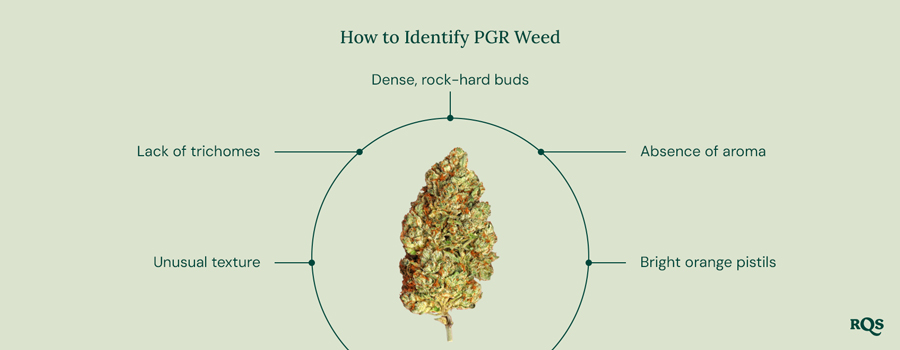
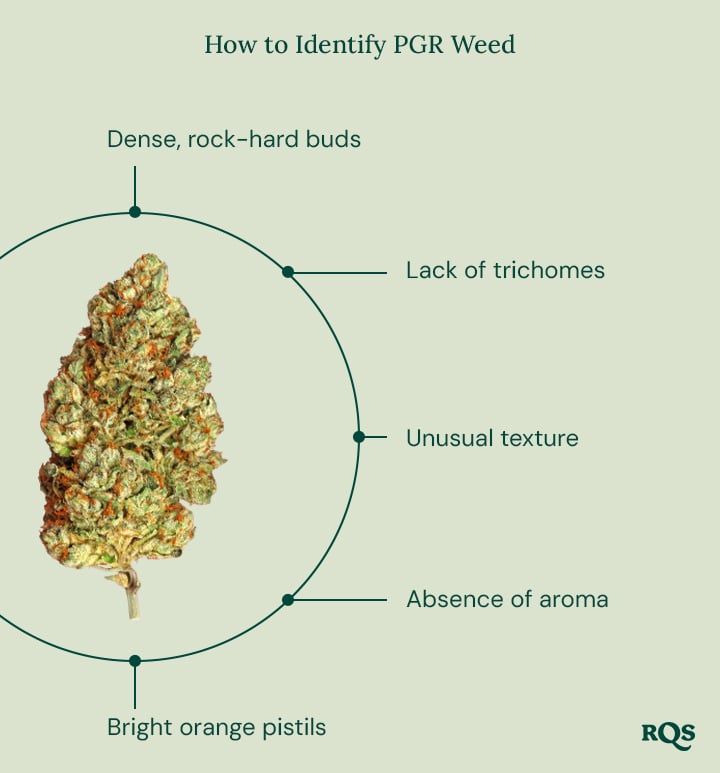
-
Step-by-Step Guide to Identifying PGR Weed
- Dense, rock-hard buds: PGR weed is extremely dense. Although some growers brag about how dense their flowers are, PGR buds look unnaturally thick. They feel heavier in the hand, and they’re slightly harder to break apart with the fingers. Weed that looks unusually thick ends up this way due to unnatural hormone hacking.
- Lack of trichomes: PGR weed has much less of a sheen compared to natural cannabis due to reduced trichome count. These sparkly glands produce cannabinoids and terpenes, so their absence results in lower potency and aroma.
- Unusual texture: PGR-treated buds often have a spongy or damp texture. Natural buds are firm but slightly sticky, while PGR weed can feel unnatural to the touch.
- Absence of strong aroma: PGRs may create thick and large flowers, but they negatively affect the terpene profile. PGR-treated flowers are much less aromatic than their natural counterparts. Even when pressing them up against your nose, you’ll detect light scents of earthiness at best.
- Bright orange pistils: PGR weed often features excessive and unnaturally bright orange pistils (the hair-like structures on buds). While pistils occur naturally, the exaggerated coloration in PGR weed is a common sign of chemical interference.
-
Comparison with High-Quality Natural Cannabis
Need to detect PGR-treated weed at a moment's notice? Use the following as a reference for telling natural and PGR cannabis apart.
- Natural cannabis has a balanced density, abundant trichomes, and a sticky but firm texture. Its aromas are rich, diverse, and strain-specific, with naturally colored pistils.
- PGR cannabis appears unnaturally dense, lacks trichomes, and may feel spongy or wet. Aromas are faint, and pistils are excessively bright and orange.
PGRs: A Reason to Grow Your Own
There’s a whole lot of weed out there, and a big portion of it contains PGRs—but there’s a silver lining to this. These contaminants make weed users think twice before buying, ultimately pushing them toward growing organically at home or purchasing naturally cultivated buds from small businesses in legal markets.
Avoiding PGR weed is better for our long-term health, our immediate enjoyment of marijuana, and for the wider environment. The more we educate ourselves about the potential dangers of the cannabis supply chain, the more we can strive to make better decisions.



























